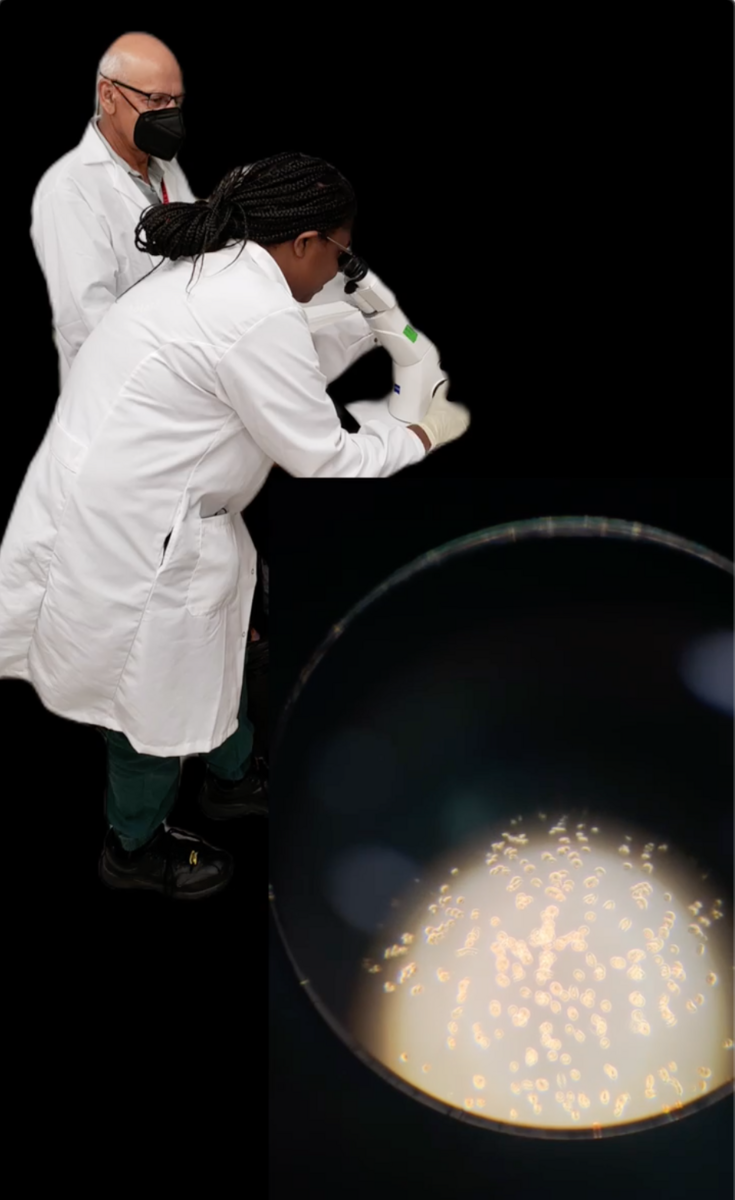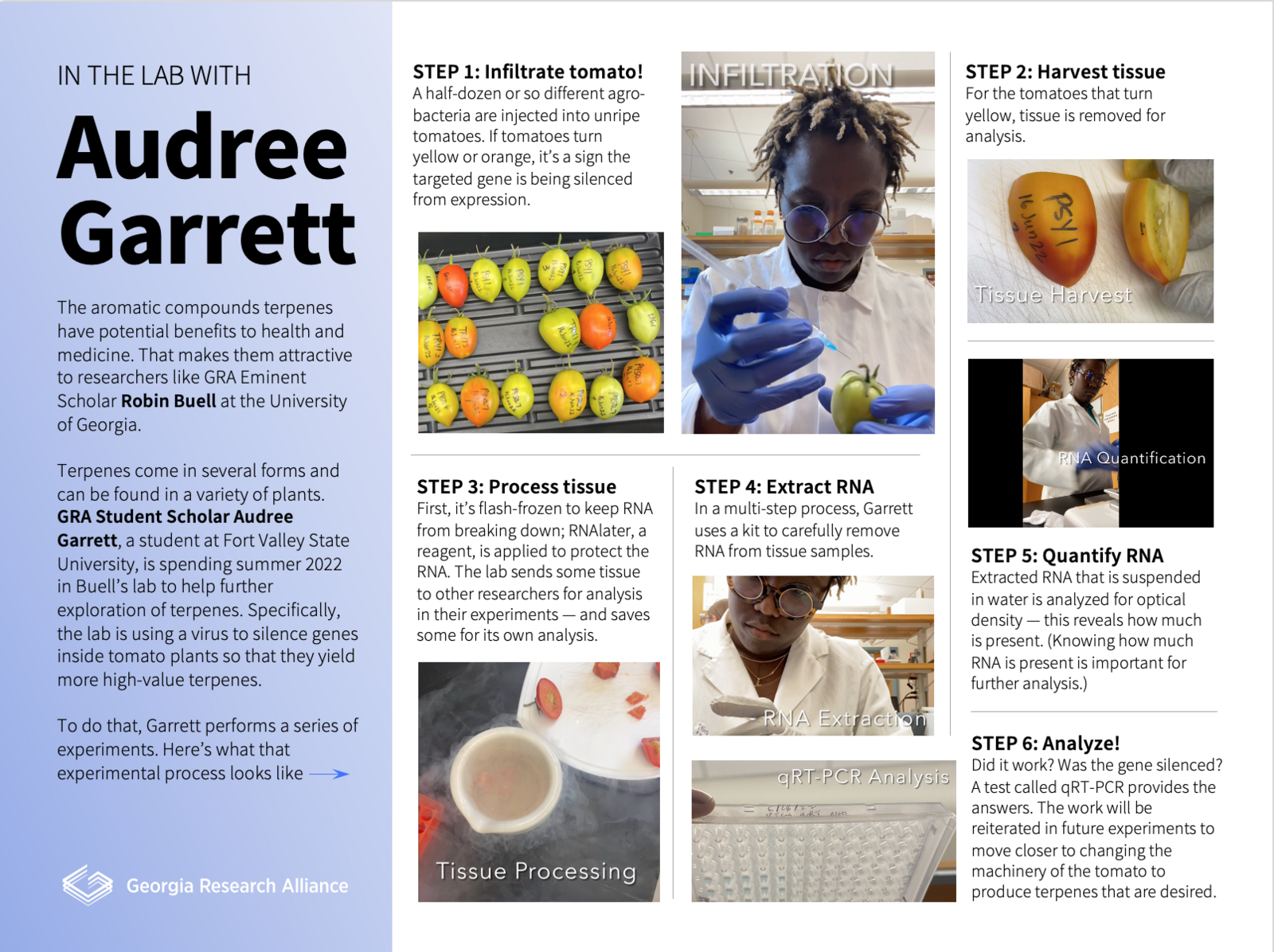July 18, 2022
My Experimental Summer

Undergrads from colleges and universities across Georgia are getting the experience of a lifetime this summer: the chance to work alongside a world-class scientist in a university lab.
The GRA Student Scholars hold full-time paid internships — and they’re not making coffee or running errands. They’re performing an array of tasks and tests that contribute to funded research projects. Many are also creating scientific posters and attending conferences.
GRA piloted the program in 2021 after the Academy of GRA Eminent Scholars decided to develop a way for students underrepresented in STEM fields to experience a research lab. In expanding the program this year, GRA worked with Peach State LSAMP, a National Science Foundation (NSF) sponsored program housed at the University of Georgia.
At the midway point, we checked in with the 15 GRA Student Scholars to see how it’s going and what they’re working on. (The short answers, collectively: 1. Really well and 2. All kinds of interesting things.) Here are a few examples.
* * * *
Have you ever tested modules for nitrogen or helium?
Riah Ivy has. Ivy, who attends Kennesaw State University, is spending the summer working in the lab of GRA Eminent Scholar Bill Koros of Georgia Tech. Here's Riah's video:
* * * *
When the aorta warns
 UGA student Demetrius Jelks shares this update from his experimental summer in the lab of GRA Eminent Scholar Neal Weintraub:
UGA student Demetrius Jelks shares this update from his experimental summer in the lab of GRA Eminent Scholar Neal Weintraub:
Abdominal aortic aneurysm (AAA) is the 15th leading cause of death in the United States, with over 3 million cases per year.
AAA forms from plaque buildup in the arteries. The buildup can cause a weak spot in the blood vessel wall; if not treated early enough, it can cause rupturing (breaking open) and hemorrhaging (severe bleeding) from inflammation.
There are currently no biomarkers or effective medical therapies for abdominal aortic aneurysms. So abdominal aortic aneurysms are typically caught during routine medical exams.
Inflammation is a key feature of abdominal aortic aneurysms, but the chemical mechanism behind the inflammation is not understood. My project specifically focuses on testing the hypothesis that 12,13-DiHOME (a linoleic acid fatty acid) produced by soluble epoxide hydrolase (an enzyme produced by the body) promotes inflammation that causes AAAs to form.
My first few weeks in Dr. Weintraub’s lab consisted of me absorbing as much information as I could. This included learning and performing different laboratory techniques such as DNA genotyping (extracting DNA from tissue), animal handling and surgery, and analysis techniques.
During this time, I shadowed other laboratory staff and took detailed notes. As I became more familiar with techniques, I began performing them to demonstrate my understanding.
Recently, I have been working on testing the hypothesis that 12,13-DiHOME, the linoleic fatty acid produced during abdominal aortic aneurysms, affects liver inflammation.
So, I have been subjecting mice livers to 12,13-DiHOMEs to see the effects. After the livers are subjected to 12,13-DiHOMEs, our lab will send the livers off to analysis labs to obtain genetic code for the livers.
This research experience has been very informative. I have learned how to apply a lot of material that I have learned across different classes including: genetics, biology and biochemistry.
* * * * *
Generating more of a chemical with extraordinary potential
GRA Eminent Scholar Robin Buell at the University of Georgia is a world expert on the genetics of plants. One area of great interest: terpenes, a chemical found in plants that has wide application in products.
Buell is exploring ways to modify plants so they naturally produce more terpenes. It's a process that holds great promise for new medicines and products that benefit people.
Working with her this summer is GRA Student Scholar Audree Garrett, a student at Fort Valley State University. Here's a look at some of the experiments she's working on in the Buell Lab (click to download).
Audree on her work: “It’s mind-blowing. I’m an intern, but I’m being exposed to some real state-of-the-art research. We’re focusing on terpenes, but the work could open the doors to so much more that could be done.”
* * * * *
Meet the investigators in the clinic
A new partner in the GRA Student Scholars program for 2022 is The Shepherd Center, a premier not-for-profit hospital specializing in helping people with spinal cord injury, brain injury and many other neuromuscular conditions.
Three GRA Student Scholars are working this summer in the Center’s Virginia C. Crawford Research Institute:
- Ka’Liyah Morgan, a UGA student, is helping to improve how the progress of patients can be assessed using wearable sensors. She's working in the lab of Brad Willingham.
- J’Lyn Martin of Kennesaw State examines how education levels, income and other social factors affect people with disabilities compared to those without. J’Lyn works in the lab of Raeda Anderson at Shepherd.
- Elorm Adzadi of UGA is engaged in an analysis of the needs and barriers of assistive technology. Elorm is in John Morris's lab at Shepherd.
* * * *
How do we know if the right proteins are in there?
The Western Blot Niyah Brown performs in the Emory lab of Larry Boise will tell us.
A student at the University of Georgia, Niyah walks us through the lab (and introduces us to KMS Cas9 and KMS cas 9 PUMA). Check out her video below.
* * * *
An Eminent Scholar’s perspective
“Georgia has many students currently underrepresented in STEM, and the GRA Student Scholars program is focused on this group,” says GRA Eminent Scholar (and Trustee) Art Edison of UGA, whose lab is hosting two student scholars this summer. “Our primary goal is to increase STEM participation and to increase the number of trained scientists and engineers who can help grow our economy. Our students are all in Georgia and have roots in Georgia, and there is a high likelihood that they will have careers in Georgia.”
• Learn more about the GRA Student Scholars program >

